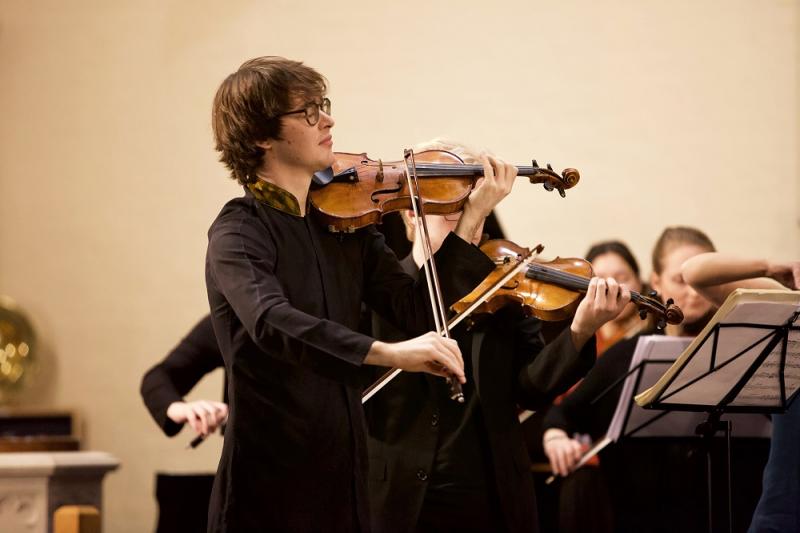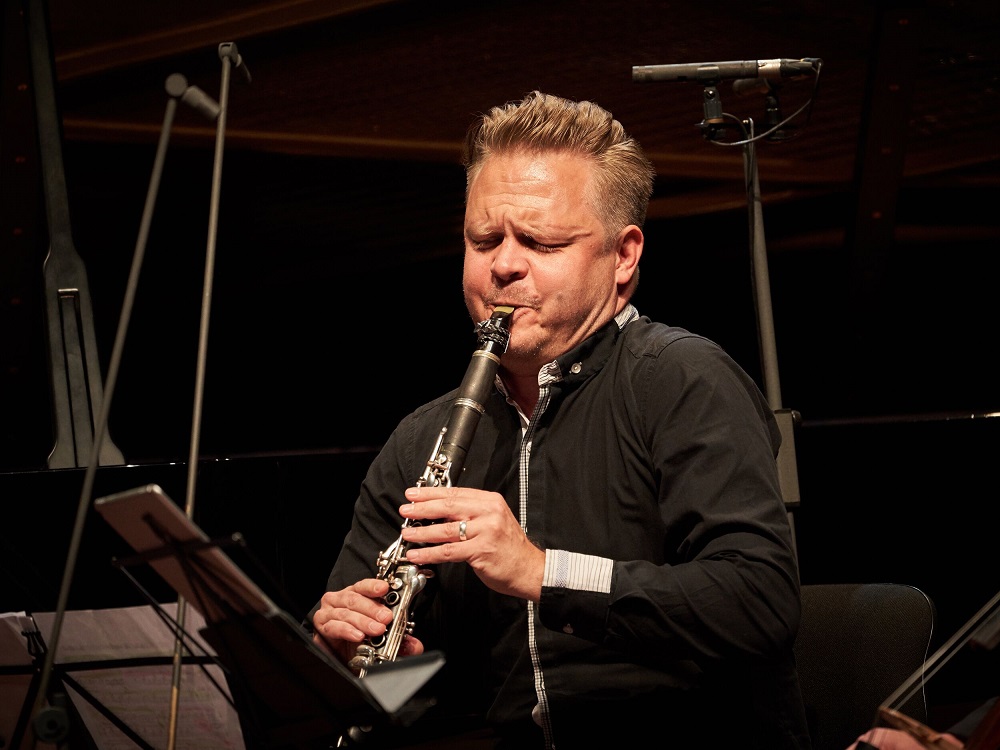O/Modernt Soloists, Sonoro Ensemble, Wimbledon International Music Festival review - pure instrumental poetry | reviews, news & interviews
O/Modernt Soloists, Sonoro Ensemble, Wimbledon International Music Festival review - pure instrumental poetry
O/Modernt Soloists, Sonoro Ensemble, Wimbledon International Music Festival review - pure instrumental poetry
Hugo Ticciati programmes superbly, but the choral side lets the peerless players down

If you're going to run a music festival with flair, it's not enough just to have a run of star performers who pop up for single events. The 11th Wimbledon International Music Festival can offer those – Christian Tetzlaff and Lars Vogt, for instance, were there a week ago.
One of a quartet of generals – the other top players were fellow violinist Johannes Marmén, viola-player Gareth Lubbe and cellist Julian Arp – Ticciati guided a very singular odyssey from four of the Contrapunctus numbers in Bach's The Art of Fugue to Beethoven's monster statement in the form, the Grosse Fuge. The link was his own as composer, deconstructing the period-instrument-style Bach in order to build up Beethoven – the first occasion in the day when Lubbe's skill as overtone singer also came into play.
Scandinavian ensembles have a special way of making these connections: at Gothenburg's Point Festival earlier this year Terje Tønnesen's Norwegian Chamber Orchestra strings dissolved the end of the Grosse Fuge so as to begin Shostakovich's Eighth Quartet (from memory). Somehow, though, it felt right that Beethoven's last big heaven-storming should end the Wimbledon first half, the players breathing air from another planet along the way. The superb acoustics of late Victorian St John's Church, Spencer Hill, with its two wooden barrel vaults, help to suspend the sound in the air: a very specific aural definition to match the sense of purpose and direction in everything I've heard the O/Modernt players do. Note, too, that by 2023 WIMF hopes to have a Gehry-designed concert hall as its base. The levitation was even more evident in the Brahms Clarinet Quintet. Having heard performances recently which seemed too robust for the usual "autumnal" label, the adjective needs pressing into service as coming closest to the November song of extraordinary O/Modernt clarinettist Christoffer Sundqvist. His were the first notes I heard in this year's Pärnu Festival, one rich in superb exponents of the instrument (not least the Estonian Festival Orchestra's lychpin Matthew Hunt; Sunqvist pictured above there by Kaupo Kikkas); and on both occasions such playing couldn't be surpassed. Low tones on the cusp of audibility were perfectly matched by the strings so that the sound seemed to dematerialise. This was cultured playing at the very highest, transcendent level.
The levitation was even more evident in the Brahms Clarinet Quintet. Having heard performances recently which seemed too robust for the usual "autumnal" label, the adjective needs pressing into service as coming closest to the November song of extraordinary O/Modernt clarinettist Christoffer Sundqvist. His were the first notes I heard in this year's Pärnu Festival, one rich in superb exponents of the instrument (not least the Estonian Festival Orchestra's lychpin Matthew Hunt; Sunqvist pictured above there by Kaupo Kikkas); and on both occasions such playing couldn't be surpassed. Low tones on the cusp of audibility were perfectly matched by the strings so that the sound seemed to dematerialise. This was cultured playing at the very highest, transcendent level.
So was the septet version of Strauss's Metamorphosen which sounded an even more wounding elegiac turn at the end of the second concert. The demands here are even more superhuman than in the 23-string standard; Ticciati seemed effortlessly in charge as quasi-conductor, giving the great lamentatory phrases Strauss adapts from Beethoven's "Eroica" funeral march and the reproaches of Wagner's King Marke to Tristan and Isolde plenty of space, and hitting the central turn from driven ecstasy back to tragedy with supreme conviction. Good, too, to hear the inner welters so clearly. Again, there was a fade to nothing at the end which I've not heard in any other performance.
Metamorphosen was intriguingly prefaced by Claudio Ambrosini's Ciaccona in Labirinto, solo guitarist Alberto Mesirca exquisite in the supernatural ornamentations. The strange meetings of the evening's first half, though, worked much less well, entirely due to the choral Sonoro Consort (pictured below by John Yip with Ticciati and Lubbe centre) delivering on nothing like the level of the instrumentalists. The opening, taking Gregorian chant from the back of the church elaborated by the women in the chancel followed by Byrd's Second Service Magnificat and Nunc Dimittis, was fine.  The problem came with Gesualdo's breathtakingly radical, truly labyrinthine "Io parto e non più dissi" and Monteverdi's madrigal arrangement of Ariadne's lament, "Lasciatemi morire". What precisely the words, set speech-melodically, express would not have been clear to an audience with the lights down (no programme texts, either), which meant that the singers needed to work much harder at the delivery. Had they gone through the Italian words and been coached in the two composers' superb settings? There was no sign of it. So the climactic threnody, unlike the Strauss, outstayed its welcome, though guidance to the centre of this labyrinth was intriguingly assisted by the golden thread of Ticciati, Lubbe – overtone-singing again, this time alongside febrile Locatelli – and double-bass player Jordi Carrasco Hjelm joining them for the brief mystery of Aurelio de la Vega's The Magic Labyrinth. No matter, in the long term; the peaks of both concerts will stay fixed in memory and imagination.
The problem came with Gesualdo's breathtakingly radical, truly labyrinthine "Io parto e non più dissi" and Monteverdi's madrigal arrangement of Ariadne's lament, "Lasciatemi morire". What precisely the words, set speech-melodically, express would not have been clear to an audience with the lights down (no programme texts, either), which meant that the singers needed to work much harder at the delivery. Had they gone through the Italian words and been coached in the two composers' superb settings? There was no sign of it. So the climactic threnody, unlike the Strauss, outstayed its welcome, though guidance to the centre of this labyrinth was intriguingly assisted by the golden thread of Ticciati, Lubbe – overtone-singing again, this time alongside febrile Locatelli – and double-bass player Jordi Carrasco Hjelm joining them for the brief mystery of Aurelio de la Vega's The Magic Labyrinth. No matter, in the long term; the peaks of both concerts will stay fixed in memory and imagination.
The future of Arts Journalism
You can stop theartsdesk.com closing!
We urgently need financing to survive. Our fundraising drive has thus far raised £49,000 but we need to reach £100,000 or we will be forced to close. Please contribute here: https://gofund.me/c3f6033d
And if you can forward this information to anyone who might assist, we’d be grateful.

Subscribe to theartsdesk.com
Thank you for continuing to read our work on theartsdesk.com. For unlimited access to every article in its entirety, including our archive of more than 15,000 pieces, we're asking for £5 per month or £40 per year. We feel it's a very good deal, and hope you do too.
To take a subscription now simply click here.
And if you're looking for that extra gift for a friend or family member, why not treat them to a theartsdesk.com gift subscription?
more Classical music
 Solomon, OAE, Butt, QEH review - daft Biblical whitewashing with great choruses
Even a top soprano and mezzo can’t make this Handel paean wholly convincing
Solomon, OAE, Butt, QEH review - daft Biblical whitewashing with great choruses
Even a top soprano and mezzo can’t make this Handel paean wholly convincing
 Two-Piano Gala, Kings Place review - shining constellations
London Piano Festival curators and illustrious friends entertain and enlighten
Two-Piano Gala, Kings Place review - shining constellations
London Piano Festival curators and illustrious friends entertain and enlighten
 Echo Vocal Ensemble, Latto, Union Chapel review - eclectic choral programme garlanded with dance
Beautiful singing at the heart of an imaginative and stylistically varied concert
Echo Vocal Ensemble, Latto, Union Chapel review - eclectic choral programme garlanded with dance
Beautiful singing at the heart of an imaginative and stylistically varied concert
 Scott, Irish Baroque Orchestra, Whelan, RIAM, Dublin review - towards a Mozart masterpiece
Characteristic joy and enlightenment from this team, but a valveless horn brings problems
Scott, Irish Baroque Orchestra, Whelan, RIAM, Dublin review - towards a Mozart masterpiece
Characteristic joy and enlightenment from this team, but a valveless horn brings problems
 Classical CDs: Voice flutes, flugelhorns and froth
Baroque sonatas, English orchestral music and an emotionally-charged vocal recital
Classical CDs: Voice flutes, flugelhorns and froth
Baroque sonatas, English orchestral music and an emotionally-charged vocal recital
 Kanneh-Mason, Britten Sinfonia, Shave, Milton Court - a grin and a big beaming smile
A pair of striking contemporary pieces alongside two old favourites
Kanneh-Mason, Britten Sinfonia, Shave, Milton Court - a grin and a big beaming smile
A pair of striking contemporary pieces alongside two old favourites
 theartsdesk at the New Ross Piano Festival - Finghin Collins’ musical rainbow
From revelatory Bach played with astounding maturity by a 22 year old to four-hand jazz
theartsdesk at the New Ross Piano Festival - Finghin Collins’ musical rainbow
From revelatory Bach played with astounding maturity by a 22 year old to four-hand jazz
 First Person: Manchester Camerata's Head of Artistic Planning Clara Marshall Cawley on questioning the status quo
Five days of free events with all sorts of audiences around Manchester starts tomorrow
First Person: Manchester Camerata's Head of Artistic Planning Clara Marshall Cawley on questioning the status quo
Five days of free events with all sorts of audiences around Manchester starts tomorrow
 Goldscheider, Brother Tree Sound, Kings Place review - music of hope from a young composer
Unusual combination of horn, strings and electronics makes for some intriguing listening
Goldscheider, Brother Tree Sound, Kings Place review - music of hope from a young composer
Unusual combination of horn, strings and electronics makes for some intriguing listening
 theartsdesk Q&A: composer Donghoon Shin on his new concerto for pianist Seong-Jin Cho
Classical music makes its debut at London's K-Music Festival
theartsdesk Q&A: composer Donghoon Shin on his new concerto for pianist Seong-Jin Cho
Classical music makes its debut at London's K-Music Festival

Add comment